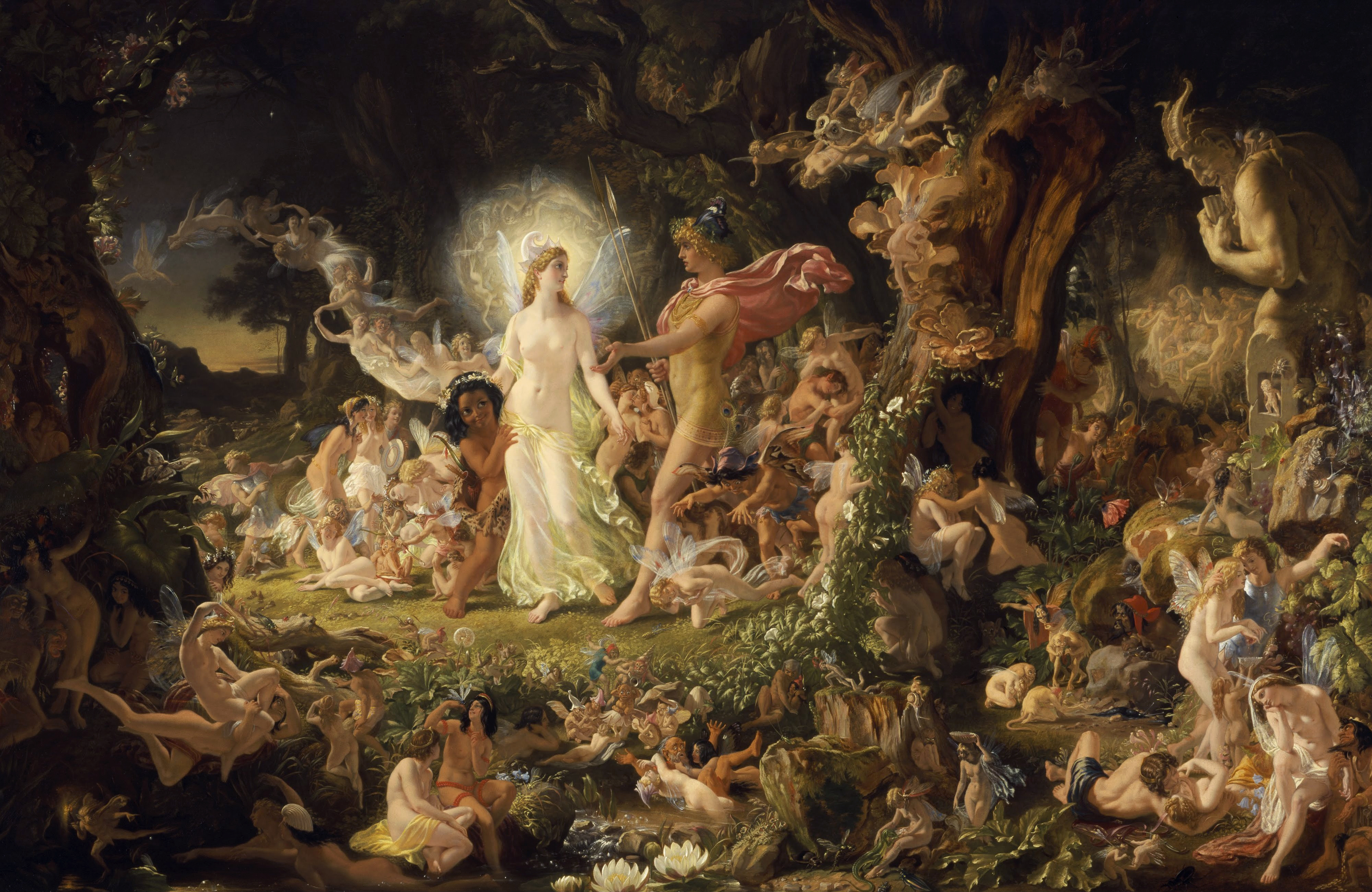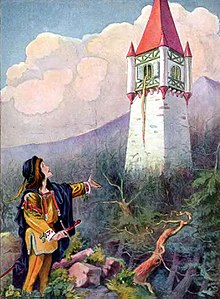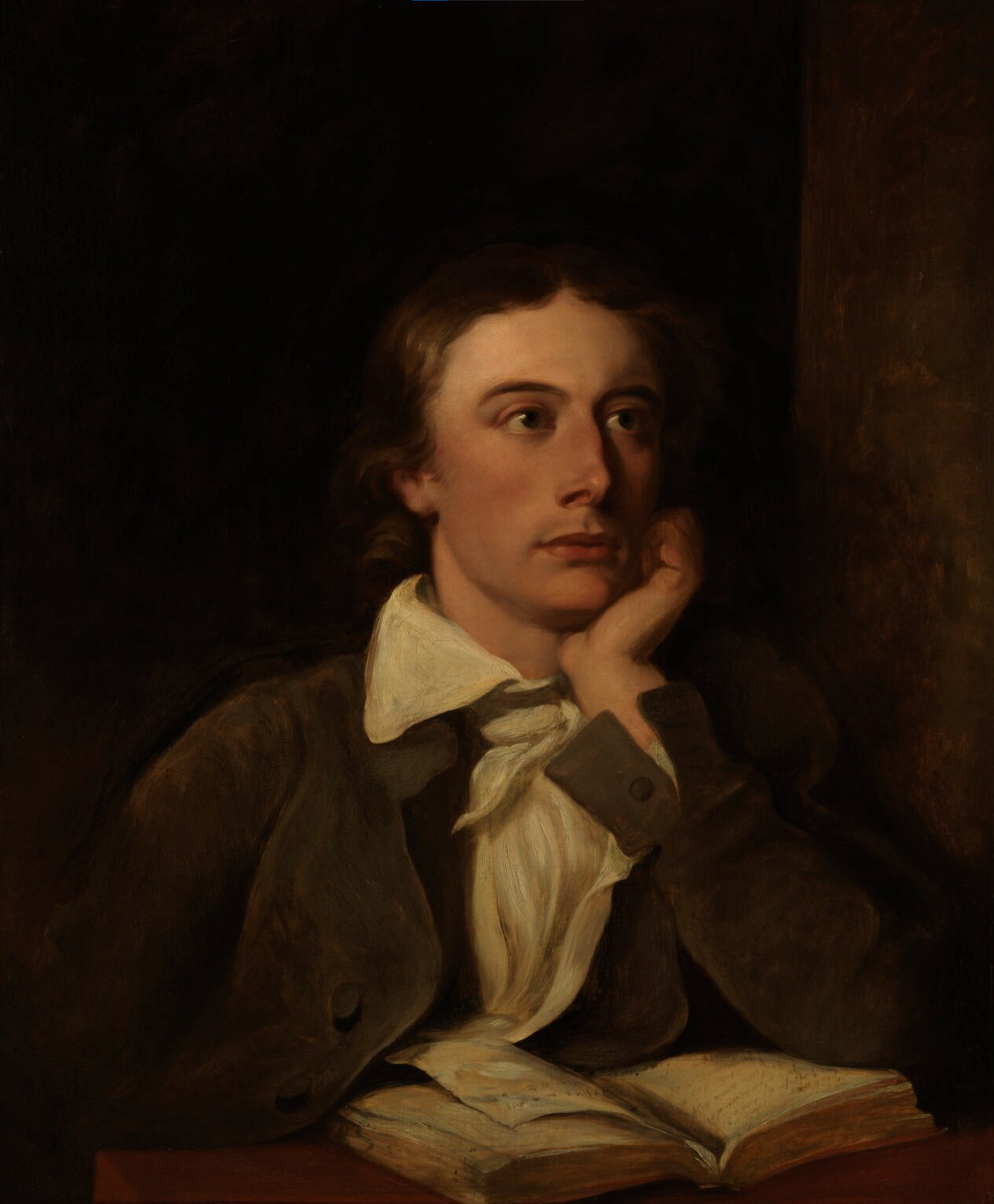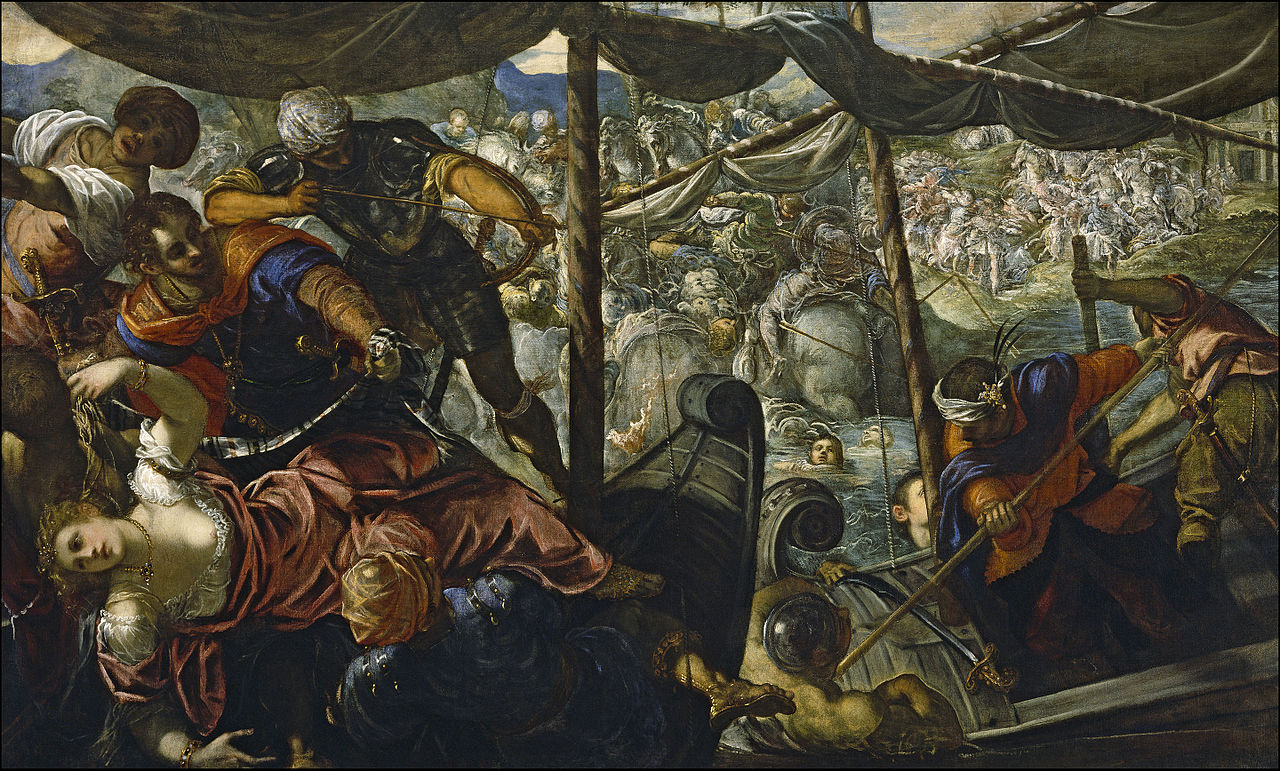Fiction
> The class of literature comprising works of imaginative narration, especially in prose form.
> Poetry (the term derives from a variant of the Greek term, poiesis, "making") is a form of literature that uses aesthetic and rhythmic qualities of language—such as phonaesthetics, sound symbolism, and metre—to evoke meanings in addition to, or in place of, the prosaic ostensible meaning.
Drama
> Drama is the specific mode of fiction represented in performance.The term comes from a Greek word meaning "action" (Classical Greek: δρᾶμα, drama), which is derived from "I do" . The two masks associated with drama represent the traditional generic division between comedy and tragedy.
A Midsummer Night's Dream
 A Midsummer Night's Dream is a comedy written by William Shakespeare in 1595/96. It portrays the events surrounding the marriage of Theseus, the Duke of Athens, to Hippolyta, the former queen of the Amazons. These include the adventures of four young Athenian lovers and a group of six amateur actors (the mechanicals) who are controlled and manipulated by the fairies who inhabit the forest in which most of the play is set. The play is one of Shakespeare's most popular works for the stage and is widely performed across the world.
A Midsummer Night's Dream is a comedy written by William Shakespeare in 1595/96. It portrays the events surrounding the marriage of Theseus, the Duke of Athens, to Hippolyta, the former queen of the Amazons. These include the adventures of four young Athenian lovers and a group of six amateur actors (the mechanicals) who are controlled and manipulated by the fairies who inhabit the forest in which most of the play is set. The play is one of Shakespeare's most popular works for the stage and is widely performed across the world.
> Summary : Lysander loves Hermia, and Hermia loves Lysander. Helena loves Demetrius; Demetrius used to love Helena but now loves Hermia. Egeus, Hermia's father, prefers Demetrius as a suitor, and enlists the aid of Theseus, the Duke of Athens, to enforce his wishes upon his daughter. According to Athenian law, Hermia is given four days to choose between Demetrius, life in a nunnery, or a death sentence. Hermia, ever defiant, chooses to escape with Lysander into the surrounding forest.
Complications arise in the forest. Oberon and Titania, King and Queen of Fairies, are locked in a dispute over a boy whom Titania has adopted. Oberon instructs his servant Puck to bring him magic love drops, which Oberon will sprinkle on the Queen's eyelids as she sleeps, whereupon Titania will fall in love with the first creature she sees upon awakening. Meanwhile, Helena and Demetrius have also fled into the woods after Lysander and Hermia. Oberon, overhearing Demetrius's denouncement of Helena, takes pity upon her and tells Puck to place the magic drops upon the eyelids of Demetrius as well, so that Demetrius may fall in love with Helena. Puck, however, makes the mistake of putting the drops on the eyelids of Lysander instead. Helena stumbles over Lysander in the forest, and the spell is cast; Lysander now desires Helena and renounces a stunned Hermia.
Finally, Oberon decides that all good sports must come to an end. He puts the four lovers to sleep and gives Lysander the antidote for the love potion so that he will love Hermia again when they all wake up. Next, Oberon gives Titania the antidote, and the King and Queen reconcile. Theseus and Hippolyta then discover Lysander, Hermia, Helena, and Demetrius asleep in the forest. All return to Athens to make sense of what they think is a strange dream. Likewise, Bottom returns to his players, and they perform "Pyramus and Thisbe" at the wedding feast (which has since become a wedding of three couples). As everyone retires, fairies perform their blessings and Puck delivers a tender epilogue soliloquy.
Dramatis Persona:
- Theseus, Duke of Athens
- Egeus, father of Hermia
- Lysander, in love with Hermia
- Demetrius, in love with Hermia
- Philosrate, Master of the Revels
- Quince, a carpenter
- Snug, a joiner
- Bottom, a weaver
- Flute, a bellows-mender
- Snout, a tinker
- Starveling, a tailor
- Hippolyta, Queen of the Amazons; betrothed of Theseus
- Hermia, in love with Lysander
- Helena, in love with Demetrius
- Oberon, King of Fairies
- Titania, Queen of Fairies
- Puck, or Robin Goodfellow
- Peaseblossom, a fairy
- Cobway, a fairy
- Moth, a fairy
- Mustardseed, a fairy
- Other Fairies, attendants to Oberon and Titania
- Attendants to Theseus and Hippolyta

> Plot Analysis
Initial Situation:
Hermia loves Lysander, Lysander loves Hermia, Demetrius loves Hermia, Helena loves Demetrius, and no one loves Helena. Oh, and Egeus wants his daughter killed if she doesn't follow his plan of marrying Demetrius.
About twenty lines into the play, we hear Egeus's complaint against his daughter Hermia, and we know the initial situation is a conflict itself. The play will definitely be about resolving this pickle.
Conflict:
Titania and Oberon quarrel. Lysander and Hermia run off together and get lost in the woods, and Demetrius and Helena follow them.
Further conflict arises in yet another set of main characters: Oberon and Titania. The fairies' fight (over a relatively small thing) has very serious consequences on the entire natural world. In contrast, the young lovers are worried about a serious thing (love), but the way they deal with it only matters to themselves and their families. The scene is set for our Athenian heroes to get involved in this other conflict. As Titania and Oberon announce that the natural world is all mixed up, the four lovers go wandering into that very natural world, with predictably zany results. We're all set for the young Athenians' problems to become even more complicated, reflecting the conflict that brews in the wood around them.

Complication:
Puck puts love potion on Lysander's eyes by accident, causing him to fall in love with Helena and forsake Hermia. Oberon enchants Demetrius and he too falls in love with Helena. Puck has turned Bottom's head into that of a donkey.
Puck's mistaken enchantment of Lysander further complicates an already difficult situation. True love has betrayed itself (Lysander leaves Hermia) and, with the addition of Demetrius's enchantment, false love appears to be true (Demetrius claims to love Helena). Now the pendulum has swung from loving Hermia to loving Helena. Elsewhere in the forest, Puck has interfered with the Mechanicals' rehearsal by transforming their main character into a beast and sending the others off screaming into the woods.
Climax:
Lysander and Demetrius fight; Hermia and Helena fight.
This is an ugly resolution to the whole love-juice situation. Demetrius and Lysander would've fought over Hermia anyway, but now they fight over Helena, which inspires Hermia to try to fight Helena. During this row in the woods, some pretty harsh words are thrown around, and ugly things get brought up from the past (like how Helena thought Hermia was a vixen when they were younger). It's especially hard to hear the girls say things like this when you know they aren't under any kind of spell (only the guys are). Titania's love for Bottom is climactic insofar as it lets us know there will be a turning point. Eventually, Oberon will have Titania released from the spell (once he gets the Indian child) and likely he'll have everything fixed with the lovers by then, too. Until then, we can enjoy the madness at the peak of the play.
Suspense:
Puck leads Demetrius and Lysander in opposite directions; Hermia and Helena's fight seems irreparable.
This part of the play would be a bit worrisome if we didn't know already that comedies end nicely. Demetrius and Lysander haven't resolved their quarrel and, even as they fall asleep, they're vowing to kill each other. Even more frightening is the emotional quarrel that's occurred between two formerly dear friends, Hermia and Helena. Helena runs away from a fuming Hermia, and the Jerry Springer-esquethings they said to each other leave open the distinct possibility that, no matter what, their friendship might never recover.
Denouement:
Oberon releases Titania from the spell. Puck gives Lysander the remedy juice. Demetrius declares that he's in love with Helena. Theseus announces that the couples will be married. And Bottom awakens with his own head back.
Oberon has gotten the Indian child that he wanted from Titania, so he no longer has any beef with his wife. When she wakes up from her enchantment, the couple goes back to normal, which restores harmony to the natural world. Puck solves the problem of Lysander loving Helena by putting the potion's remedy on Lysander's eyes. He solves the problem of Demetrius not loving Helena by leaving the pansy-juice on Demetrius's eyes. Thus, when everyone wakes up, the couples have neatly paired off. Finally, the transformation and return of a normal-headed Bottom to Athens solves the Mechanicals' worry that they couldn't put on the play.
Conclusion:
The three couples are married in Athens. Pyramus and Thisbe is performed. Oberon, Titania, and Puck bless the house and the couples.
All the Mechanicals' hard work finally pays off—they get to perform a play that touches on the severity of what could have happened to two doomed lovers (Pyramus and Thisbe here serve as a tragic reflection of the happier Lysander and Hermia). While the humans leave the play in party hats, the fairies come out and close the play, saying matters in the world are really more serious than all this might suggest. Puck reminds us that everyone will die, which is a nice conclusion. Oberon and Titania offer the real conclusion by promising that the characters are all busy (even while they speak) making babies, which is a good way to preserve yourself from death. Also, Oberon promises the couples will be happy and in love for the rest of their lives.
** QUOTES **
EGEUSFull of vexation come I, with complaintAgainst my child, my daughter Hermia.—
Stand forth, Demetrius.—My noble lord,This man hath my consent to marry her.—
Stand forth, Lysander.—And my gracious duke,This man hath bewitch'd the bosom of my child.—
Thou, thou, Lysander, (1.1.23-29)
> Here, we learn that Hermia and Lysander are in love but unable to marry because Hermia's father (Egeus) has engaged her to another man (Demetrius). Still, the play is sympathetic toward a young person's right to choose a marriage partner based on love and not the whims and desires of parents. (Shakespeare returns to this subject in several other plays like Romeo and Juliet, The Merchant of Venice, and The Taming of the Shrew.)
LYSANDER
Demetrius, I'll avouch it to his head,
Made love to Nedar's daughter, Helena,
And won her soul; and she, sweet lady, dotes,
Devoutly dotes, dotes in idolatry,
Upon this spotted and inconstant man. (1.1.108-112)
> Hmm. This is interesting. Here, we learn that Demetrius was once engaged ("made love to") to another girl, Helena, before dropping her to be with Hermia. Long before the fairies' love juice causes Demetrius to fall back in love with Helena (2.2; 3.2), we learn that lovers can be fickle and erratic, even without the help of some magic potion.
THESEUSFair lovers, you are fortunately met.Of this discourse we more will hear anon.—
Egeus, I will overbear your will,For in the temple, by and by, with us,These couples shall eternally be knit.— (4.1.184-188)
> In A Midsummer Night's Dream, the seemingly natural course of love ends in marriage. (This is true of all Shakespearean comedies; head over to the "Genre" section for all the deets.) Here, Theseus's wedding day has finally arrived and the two sets of Athenian lovers have been paired up, despite Egeus's objections. Still, this seemingly happy ending leaves us a little nervous, if not skeptical. After all, the only reason Demetrius loves Helena is that he's under the spell of the magic love juice.
Greyhound Lines
Greyhound Lines, Inc., usually shortened to Greyhound, is an intercity bus common carrier serving over 3,800 destinations across North America. The company's first route began in Hibbing, Minnesota in 1914, and the company adopted the name The Greyhound Corporation in 1929. Since October 2007, Greyhound has been a subsidiary of British transportation company FirstGroup, but continues to be based in Dallas, Texas, where it has been headquartered since 1987. Greyhound and sister companies in FirstGroup America are the largest motorcoach operators in the United States and Canada.
Globe Theater
The Globe Theatre was a theatre in London associated with William Shakespeare. It was built in 1599 by Shakespeare's playing company, the Lord Chamberlain's Men, on land owned by Thomas Brend and inherited by his son, Nicholas Brend and grandson Sir Matthew Brend, and was destroyed by fire on 29 June 1613. A second Globe Theatre was built on the same site by June 1614 and closed by an Ordinance issued on 6 September 1642.
A modern reconstruction of the Globe, named "Shakespeare's Globe", opened in 1997 approximately 750 feet (230 m) from the site of the original theatre. From 1909, the current Gielgud Theatre was called "Globe Theatre", until it was renamed (in honour of John Gielgud) in 1994.
The Tempest
The Tempest is a play by William Shakespeare, believed to have been written in 1610–11, and thought by many critics to be the last play that Shakespeare wrote alone. It is set on a remote island, where the sorcerer Prospero, rightful Duke of Milan, plots to restore his daughter Miranda to her rightful place using illusion and skilful manipulation. He conjures up a storm, the eponymous tempest, to cause his usurping brother Antonio and the complicit King Alonso of Naples to believe they are shipwrecked and marooned on the island. There, his machinations bring about the revelation of Antonio's lowly nature, the redemption of the King, and the marriage of Miranda to Alonso's son, Ferdinand.
The story draws heavily on the tradition of the romance, and it was influenced bytragicomedy, the courtly masque and perhaps the commedia dell'arte. It differs from Shakespeare's other plays in its observation of a stricter, more organised neoclassical style. Critics see The Tempest as explicitly concerned with its own nature as a play, frequently drawing links between Prospero's "art" and theatrical illusion, and early critics saw Prospero as a representation of Shakespeare, and his renunciation of magic as signalling Shakespeare's farewell to the stage. The play portrays Prospero as a rational, and not an occultist, magician by providing a contrast to him in Sycorax: her magic is frequently described as destructive and terrible, where Prospero's is said to be wondrous and beautiful.
> Summary :
THE TEMPEST SUMMARY: A MAGICAL STORM
The Tempest begins on a boat, tossed about in a storm. Aboard is Alonso the King of Naples, Ferdinand (his son), Sebastian (his brother), Antonio the usurping Duke of Milan, Gonzalo, Adrian, Francisco, Trinculo, and Stefano.
Miranda, who has been watching the ship at sea, is distraught at the thought of lost lives. The storm was created by her father, the magical Prospero, who reassures Miranda that all will be well. Prospero explains how they came to live on this island: they were once part of Milan’s nobility – he was a Duke and Miranda lived a life of luxury. However, Prospero’s brother exiled them – they were placed on a boat, never to be seen again.
Prospero summons Ariel, his servant spirit. Ariel explains that he has carried out Prospero’s orders: he destroyed the ship and dispersed its passengers across the island. Prospero instructs Ariel to be invisible and spy on them. Ariel asks when he will be freed and Prospero tells him off for being ungrateful, promising to free him soon.

CALIBAN: MAN OR MONSTER?
Prospero decides to visit his other servant, Caliban, but Miranda is reluctant, describing him as a monster. Prospero agrees that Caliban can be rude and unpleasant, but is invaluable to them because he collects their firewood.
When Prospero and Miranda meet Caliban, we learn that he is native to the island, but Prospero turned him into a slave raising issues about morality and fairness in the play. Prospero reminds Caliban that he tried to violate his daughter!

LOVE AT FIRST SIGHT
Ferdinand stumbles across Miranda and, much to Prospero’s annoyance, they fall in love and decide to marry. Prospero warns Miranda off and decides to test Ferdinand’s loyalty.
The rest of the shipwrecked crew are celebrating their survival and grieving for lost loved ones. Alonso believes that he has lost his beloved son, Ferdinand.
| Miranda and Ferdinand |
CALIBAN’S NEW MASTER
Stefano, Alonso’s drunken butler, discovers Caliban in a glade. Caliban decides to worship the drunken Stefano and make him his new master in order to escape Prospero’s power. Caliban describes Prospero’s cruelty and persuades Stefano to murder him by promising that Stefano can marry Miranda and rule the island.
The other shipwreck survivors have been trekking across the island and stop to rest. Ariel casts a spell on Alonso, Sebastian, and Antonio and derides them for their treatment of Prospero. Gonzalo and the others think that the spellbound men are suffering from the guilt of their past actions and promise to ensure their safety.
Prospero finally concedes and agrees to the marriage of Miranda and Ferdinand and goes off to foil Caliban’s murderous plot. He orders Ariel to hang out beautiful clothes to distract the three fools.
When Caliban and Stefano discover the clothes, they decide to steal them – Prospero arranges for goblins to “grind their joints”.
 |
| Stephano, Trinculo, and Caliban |
PROSPERO’S FORGIVENESS
Prospero assembles his enemies: Alonso, Antonio, and Sebastian. After chastising them for their past treatment of him and his daughter, he forgives them. Alonso discovers that his son Ferdinand is still alive and in love with Miranda. Plans are made to return to Milan. Prospero also forgives Caliban and grants Ariel his freedom.
 |
| Prospero |












